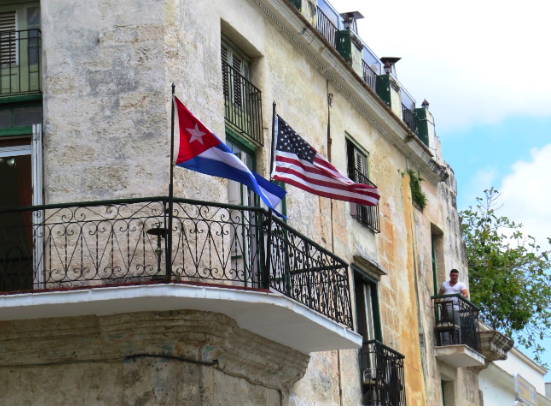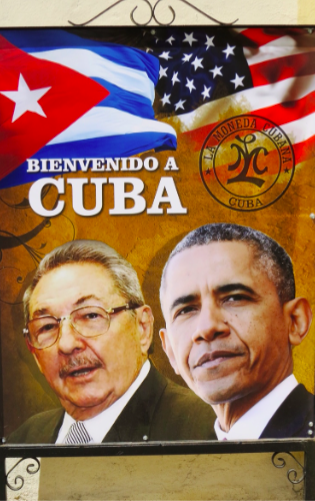The Cuban people are hurting. Food is in short supply and some are on the verge of starvation. The virus is rampant and there is a severe shortage of syringes to administer vaccines. Pharmacies are virtually empty. The people are innocent victims, and are being held hostage by cruel and cynical forces over which they have no control.
When I watch the demonstrations in Miami, I ask myself: Where is this all headed? Is harming the Cuban people a way to bring about positive change or does it just lead to greater suffering.

It does not have to be this way. I personally observed the success of President Obama’s opening up to Cuba. The lives of the average Cuban improved dramatically. There was a growing sense of optimism and the scent of liberation in the air.
Instead of nurturing these changes in Cuba, the Trump Administration returned to the path of antagonism and confrontation. Cuba was cast into a downward economic spiral. Hope for the future was dashed. President Biden, despite his promises during the campaign, has perpetuated Trump’s policies. The question must be asked: What harm would come from humanitarian aid to the people of Cuba?
I visited Cuba a few days after Obama’s visit and saw US flags flying alongside of Cuban flags in the streets of Havana. Given the history of hostility this seemed impossible. Yet there they were, along with posters of Obama and Raul Castro welcoming the president to Cuba.
Obama’ trip was a crowning moment in his and the then-Cuban President Raul Castro’s ambitious effort to restore normal relations between their two countries.
At a ceremony at the Jose Marti Monument in Havana, Obama was welcomed by the Cuban National Orchestra playing the US National Anthem during a tribute to Jose Marti. Obama said: “It is a great honor to pay tribute to Jose Marti, who gave his life for the independence of Cuba. His passion for liberty, freedom and self-determination lives on in the Cuban People Today.”

During his visit President Obama delivered a speech at the Gran Teatro in Havana. “I have come here to bury the last remnant of the cold war in Americas,” he said in a live speech broadcast to the Cuban People. With the Cuban president looking on Obama commented on Cuba’s crackdown of dissent stating, “I believe citizens should be free to speak their minds without fear.”
Obama met with dissidents and civil society leaders at the United States Embassy in Havana. The meeting included independent journalists, a dissident women’s group leader, a civil rights lawyer and a gay rights advocate. Some of the people who attended had served long prison sentences, and one was known for frequent hunger strikes.
Prompted by President Obama’s visit, and just days later, The Rolling Stones staged a major concert in Havana. Cubans were excited and it was estimated that more than 100,000 people attended the concert. People who were at the concert said there was a spreading sense of hope and liberation. The concert was the result of months of diplomacy conducted after the United and Cuba announced in 2014 that they would repair decades of broken relations.
For years, following the Cuban Revolution, rock music was banned on Cuban state TV and radio. Cubans who wore long hair and beards faced harassment from officials, including Fidel Castro who told them to dress like men.
No more.
Even before President Obama’s historic visit to Cuba Major League Baseball initiated an opening with Cuba. In December of 2015 Hall of Famers Joe Torre and Dave Winfield led a delegation from Major League Baseball and the Player’s Association on a goodwill trip to Cuba. The group included Cuban-born players Yasiel Puig, Jose Abreu, Alexie Ramirez and Brayan Pena long with Miguel Cabrera and Clayton Kershaw. The visit included baseball clinics and charity events.
The next March at the same time as Obama’s visit Major League Baseball, with a focus on improving relations between the once estranged countries, sent a large delegation to Havana. Baseball Commissioner Rob Manfred led the delegation. He said: “One of the great things about baseball is that it is part of the fabric of American culture… I am absolutely convinced that baseball is also part of fabric of Cuban culture.” As part of the visit the two cultures came together for exhibition games between the Tampa Bay Rays and the Cuban National Team at the Estadio Latinamericano in Havana.
Obama commented that: “There is so much Americans and Cubans share in cultures and passions, or hopes for the future, not to mention a love of baseball.”
In June, as it has every year since 1992 the United Nations General Assembly voted overwhelmingly in support of a resolution that calls for the US to lift its embargo against Cuba. This year the pleading focused on the devastating impacts of the economic blockade during the COVID pandemic.
The United States is virtually isolated in the World. The vote was 184 in favor, with the only no votes being the US and Israel. The resolution states that the blockade goes against International law and the UN Charter.
The embargo is hurting Cuba’s ability to access medical supplies and equipment to respond to the virus. In their remarks, several delegations pleaded for compassion and solidarity during the COVID-19 pandemic. Many expressed the hope that the US and Cuba could work together to repair a rapprochement that began under the Obama administration, but was dismantled by Trump.
President Biden has a choice to make at this point. He can continue the humanitarian disaster by adhering to Trump’s policies or start the process of returning to the Obama policies and help to alleviate some of the suffering. The least he can do is to:
- Allow for the immediate shipment of syringes and relief aid so that vaccines can be administered and other foodstuffs and necessities can be delivered.
- Restore the ability for families to send money to their relatives in Cuba, and
- Re-open the US embassy in Havana to create a desperately needed channel for commination and allow for the normal processing of visas.





